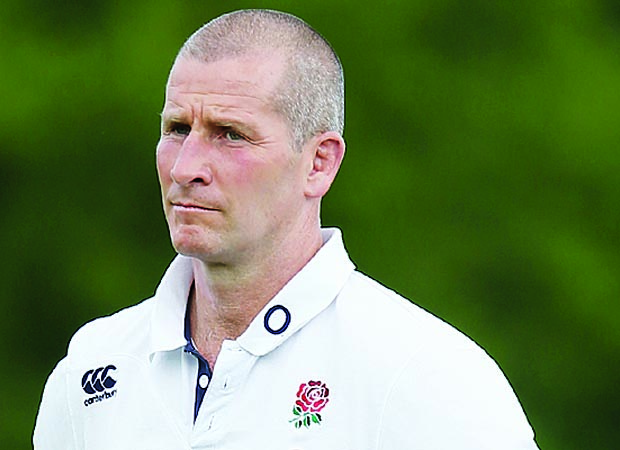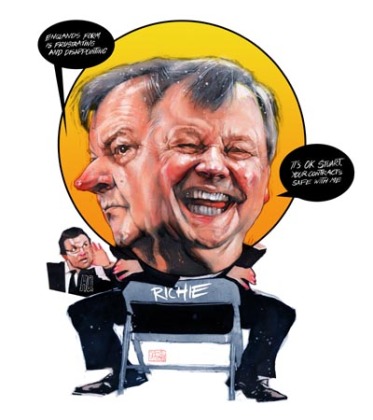
 Ian Ritchie delivered an intriguing line in double-speak as he delivered his verdict on England‘s autumn return of two losses and one win against the Southern Hemisphere big three, and one win over Samoa. On one hand the RFU chief executive described the series, coming on top of three summer tour defeats by New Zealand, as “not satisfactory”.
Ian Ritchie delivered an intriguing line in double-speak as he delivered his verdict on England‘s autumn return of two losses and one win against the Southern Hemisphere big three, and one win over Samoa. On one hand the RFU chief executive described the series, coming on top of three summer tour defeats by New Zealand, as “not satisfactory”.
On the other, he told the England coaching team of Stuart Lancaster, Andy Farrell, Graham Rowntree and Mike Catt that their controversial recent six year deal, confirming them in office until the 2019 World Cup in Japan, was as safe as houses.
Ritchie told them that if they missed out on a Six Nations title for the fourth season in succession on Lancaster’s watch that, “there will be no shivers of doubt” about his decision to award them long-term contracts unparalleled in England coaching history.
In the process, Ritchie offered Lancaster and company a free pass in the event of a loss to Wales at the Millennium Stadium in the Six Nations opener in early February: “Friday night in Cardiff for our first match? It doesn’t get much more difficult than that. Unless we lost 76-0, then we’d be a bit upset.”
The 76-0 scoreline was a reference to the record defeat sustained by an England third string side under Clive Woodward against Australia in Brisbane on the 1998 ‘Tour from Hell’.
Having a dig at Woodward is a little bit like Ritchie throwing stones from a very large illuminated glasshouse, simply because Woodward’s record against the Southern Hemisphere nations is unimpeachable, and he remains the only Northern Hemisphere coach to have won the World Cup.
By his own admission, Woodward was surprised that he was retained as England coach on the basis of his record from 1997 to 1999, culminating in being ditched out of the 1999 World Cup after losing to South Africa in the quarter-finals.
In the end he was rescued by his old mates from the 1980 Grand Slam side, Fran Cotton and Bill Beaumont, who at that stage were main movers and shakers in the RFU hierarchy.
Woodward prevailed on them, and Francis Baron, one of Richie’s predecessors as chief executive, to give him another chance. Thereafter, Woodward says that his mindset was one of, ‘if I don’t win, I’m going to get fired’ – and the rest is history.
 However, like most England coaches before Lancaster there was never any question of Woodward being given a six year contract, with two or three year rolling contracts the norm.
However, like most England coaches before Lancaster there was never any question of Woodward being given a six year contract, with two or three year rolling contracts the norm.
In the immediate aftermath of the contract extension being announced for Lancaster and his coaches in October it had a mixed reception. In one camp there were those who, like Ritchie, believe that the long-term contract gives the coaches the stability and consistency to focus on the job without any distractions.
The alternative view – and one shared by Woodward – is that it will become a millstone. He argues that even if it diminishes the team’s hunger and ‘fear factor’ by a tiny percentage it is detrimental, curtailing ambition.
Woodward adheres to the view that if the players’ Test careers are on the line every time they play, then it is important that the coaches are in the same position. All for one, and one for all.
There is also the argument that, if the RFU’s commitment is not matched by Lancaster and his coaches delivering success on the field, then the length of contract – and the substantial wage packets involved – could become a massive distraction.
The RFU’s lack of transparency over the terms of the contracts is another concern.
The RFU are essentially a co-operative, with the professional and grassroots clubs in England as their members. As such there is a coherent argument that the salaries of their main officers – including the national team coaches – should be public, just as they are with most major companies.
This should also involve transparency about any break clauses, because at the moment no-one other than those in the RFU hierarchy knows how big the financial cost to the Union would be if they decided to dispense with the services of the current coaching team before their term was up.
The reality is that Lancaster, who is believed to be on an annual salary of just under £400,000, is extremely well remunerated for the pressure he has to absorb as England head coach.
Furthermore, salaries of that magnitude in professional sport (and elsewhere) are awarded for the very reason that they come with very little in the way of job security.
That Richie has awarded the England coaches job security along with some of the biggest salaries in the professional game – presumably on the advice of Rob Andrew (RFU professional rugby director) – sets a precedent.
Whether it is a successful policy we will only know after the 2015 World Cup, but the suspicion is that deliver or not, it will have cost the RFU a packet.
*This article was first published in The Rugby Paper on December 7.


Latest News
Skivington playing it smart at Gloucester

Latest News
English second tier gets rebrand

























You must be logged in to post a comment Login